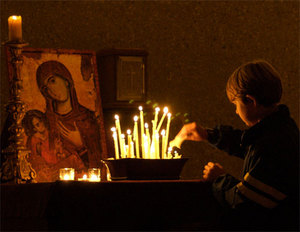[T]he sacraments constitute the events of a time which is the tension between the Resurrection and the Parousia …. Thus during the delay of the Parousia, the Eucharist prevents humanity, in this foretaste of celestial food …. And the Eucharist is the sacrament of unity which gathers about Christ of glory, present in the community, all nations in order to offer them through His hands to the Father.
Tag: parousia
Advent Presence
As we are at the midway point in the liturgical season of Advent (in the roman rite) it is helpful to remember what we doing and why we are doing it. Pope Benedict is helpful in recalling the essence of the season.
“Advent” does not mean “expectation,” as some may think. It is a translation of the Greek word parousia which means “presence” or, more accurately, “arrival,” i. e., the beginning of a presence. In antiquity the word was a technical term for the presence of a king or ruler and also for the God being worshiped, who bestows his parousia on his devotees for a time.
“Advent,” then, means a presence begun, the presence being that of God. Advent reminds us, therefore, of two things: first, that God’s presence in the world has already begun, that he is present though in a hidden manner; second, that his presence has only begun and is not yet full and complete, that it is in a state of development, of becoming and progressing toward its full form.
His presence has already begun, and we, the faithful, are the ones through whom he wishes to be present in the world. Through our faith, hope, and love he wants his light to shine over and over again in the night of the world.
That night is “today” whenever the “Word” becomes “flesh” or genuine human reality. The Christ child comes in a real sense whenever human beings act out of authentic love for the Lord.
Benedictus
Pope Benedict XVI
